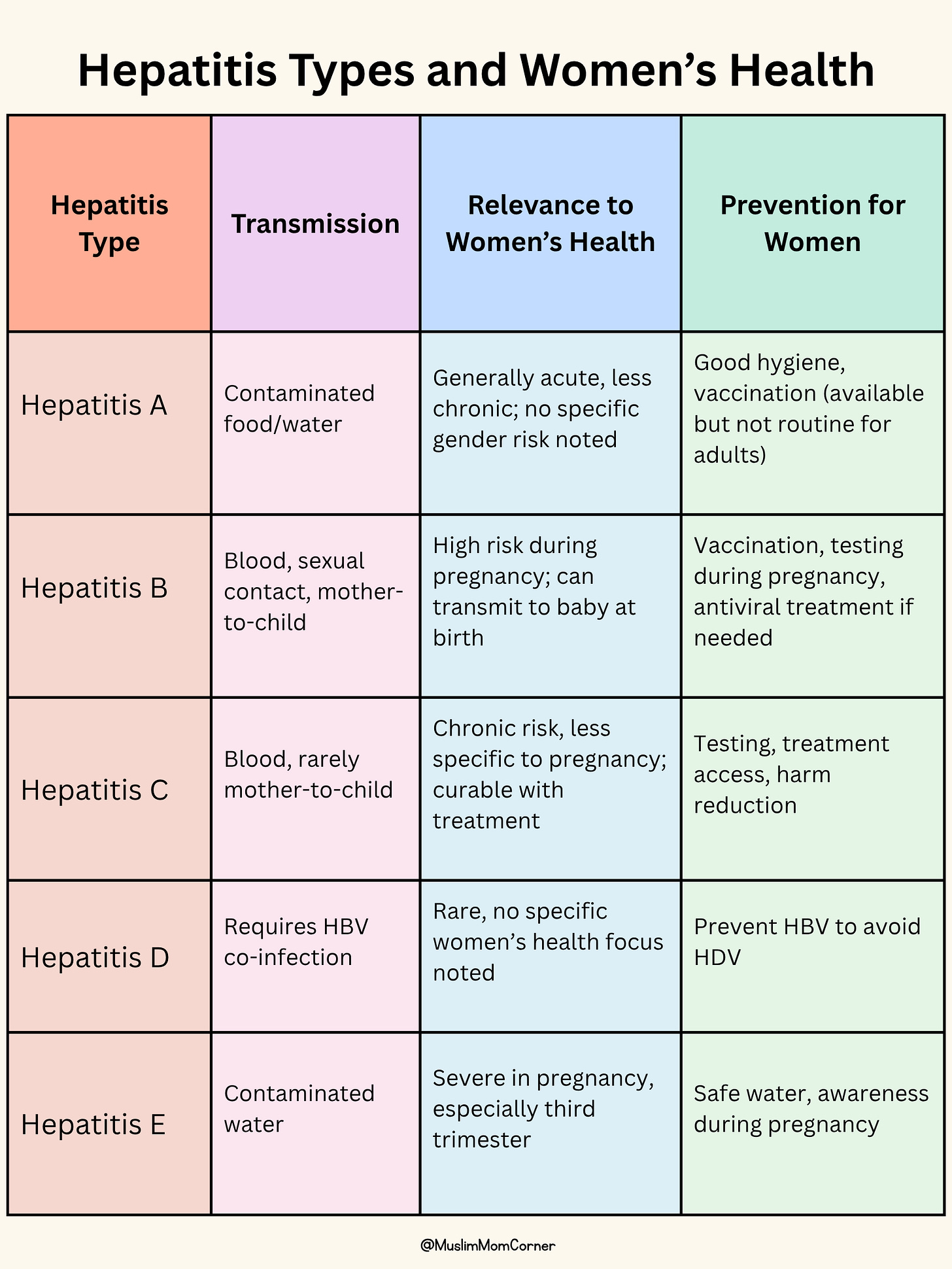A World Hepatitis Day Special for Women Carrying the Gift of Life
Understanding Hepatitis Risks During Pregnancy and the Steps Mothers Can Take
Dear Readers,
Today, July 28th, marks World Hepatitis Day, and this year’s theme, “Let’s Break It Down,” couldn’t be more relevant. As mothers and caregivers, we often find ourselves in the role of health protectors—not just for ourselves, but for the tiny lives we carry or raise.
The focus of this newsletter is on what hepatitis means for us as women—especially during pregnancy—and why this often-overlooked topic deserves our attention.
First, What Is Hepatitis?
Hepatitis refers to inflammation of the liver, often caused by viruses—primarily hepatitis A, B, C, D, and E. Each type spreads differently, affects people differently, and carries different levels of risk. But when it comes to pregnancy, three stand out: hepatitis B, C, and E.
These types don’t just impact the mother’s health—they can directly affect the baby. In some cases, transmission occurs during birth. In others, it’s the mother’s health that suffers most during the later stages of pregnancy.
Let’s break each one down in plain terms.
Hepatitis and Pregnancy: A Closer Look
Hepatitis B (HBV)
This is the most common form of chronic hepatitis worldwide. A pregnant woman who is HBV-positive—especially if she has a high viral load—can pass the virus to her baby during delivery.
But there’s good news: If caught in time, this risk can be nearly eliminated. Screening, antiviral treatment in late pregnancy, and vaccinating the newborn at birth are proven steps that protect both mother and child.
Without intervention, transmission rates can reach 90%. With vaccination and immune globulin, that risk drops dramatically—often below 1%.
Hepatitis C (HCV)
While less likely to transmit from mother to baby (~5% risk), HCV still matters. It has been linked to preterm birth, intrahepatic cholestasis, and other complications. Rates of HCV in pregnancy are rising—especially among women of reproductive age with a history of injection drug use.
Current guidelines recommend screening every pregnant woman for HCV, even if no symptoms are present. Though treatment is typically postponed until after delivery.
Hepatitis E (HEV)
This one is often missed in mainstream conversations—but deserves serious attention. HEV spreads through contaminated water, and for pregnant women, especially in the third trimester, it can be devastating.
In high-risk regions, maternal mortality can reach 30%. There is no widely available vaccine. Prevention relies on safe water, clean food, and good hygiene—especially important when traveling or living in areas with poor sanitation.
Hepatitis Types and Their Impact on Women’s Health
Hepatitis viruses differ in transmission, severity, and impact, but for pregnant women, hepatitis B, C, and E are most relevant. Below is a detailed breakdown based on recent research and guidelines:
What Can You Do?
If you are pregnant, planning to conceive, or simply want to stay informed, here are the recommended steps:
Get screened: Ask your OB-GYN about hepatitis B and C testing. This should be part of every prenatal checkup.
Get vaccinated: Hepatitis A and B vaccines are safe during pregnancy. If you’re not already immune, this is an important conversation to have.
Talk to your doctor: If you test positive for HBV, you may be eligible for safe antiviral treatment in the third trimester.
Maintain hygiene when traveling: Especially to areas where hepatitis E is more common. Stick to bottled or boiled water and well-cooked foods.
Know your newborn’s needs: If you have hepatitis B, your baby should receive both the vaccine and a special immune shot within 12 hours of birth.
For Mothers: Health, and Responsibility
Vaccination is not just permissible—it is a preventive act of care. Clean water, hygiene, and knowledge are not luxuries; they are responsibilities. When we care for our health, we honor our role as mothers and stewards of life.
Final Thoughts
World Hepatitis Day 2025 is a reminder that sometimes the most serious health threats are the least visible. As mothers, we already carry the weight of nurturing and protecting. Let’s add one more shield to that care: awareness.
This week, I encourage you to:
Ask your provider about hepatitis screening
Share this newsletter with other women in your community
Talk to your children about safe hygiene practices
Protecting health is an act of love. And love, as we know, starts from the very beginning.
With warmth,
Summaya



